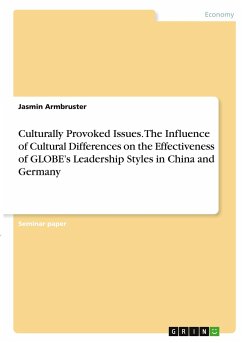During the last century, the world has become much more globalized. Companies of different sizes have entered and expanded into global markets. International distribution and production networks have been set up, and products as well as services are now available to global masses. Once an organization decides to do business in new markets, its employees all over the world are forced to work together. Intercultural communication is a challenge that today's managers of global firms inevitably have to face. This paper analyzes conflicts that arise from frequent communication between headquarters and subsidiaries. Using a qualitative research approach, it investigates the impact of culture and other factors. It also provides tips and recommendations to today's global manager on how to manage intercultural communication successfully.
Bitte wählen Sie Ihr Anliegen aus.
Rechnungen
Retourenschein anfordern
Bestellstatus
Storno








